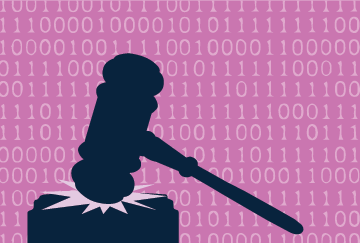Opinion | Consider personal side of data collection | II
November 28, 2019
Last week, I wrote about the current regulations in data usage and privacy. I argued they are not comprehensive enough to guarantee users’ positive rights to their data. For this week, I want to focus on explaining what results in the threats on our data privacy and why should we care about it.
First, compare these two scenarios. In the first scenario, you go shopping for a scarf as a gift for a friend. You drive to the market place and walk past different shops along the way. You stop by the Apple store and fiddle with the newly released iPhone and talk with one of the employees. You also bump into some friends and chat with them for a bit. Finally, you reach the clothing store but decide not to buy the scarf. On your brief trip to the mall, most of the trace you left behind is general, and no one can trace it back to you. If it is personal, then it’s not permanently preserved and not available to be checked and studied.
In the second scenario, you logged onto Amazon to shop for a scarf. But as soon as you entered the ‘cyber place,’ you are stamped with a barcode. So, when you browsed through different items on the web page, Amazon immediately started to collect data on the items, analogous to actual stores, you visited on its domain. You might stop by ‘stores’ you wouldn’t visit in the actual mall. For example, you browsed the makeup store for your girlfriend or you shopped for a video game for your boyfriend. Some places you might not visit in real life because of social pressure.
However, your ‘trip’ in the cyber place is permanently documented in much richer detail than your in-person visit to the mall. The domain owner has the data on how long you’ve stayed on a specific webpage and the types of items you’ve looked at. If you also happened to have an account that has your payment information and address, it is also possible to know exactly who you are. And one day, some time after your “trip” to the cyber place, when you browse through the web pages on your computer with a friend, some ads about makeup or video games just pop up.
This kind of threat on privacy results from the combination of several factors. First, users in cyberspace leave personal information with every click, contributing to the vast wealth of information accrued by companies. Second, the ability of companies to mine and store these data with relatively low cost facilitates that collection. Third, the increasing ability to explore and analyze these data in turn compounds the amount of information that companies have. With huge data warehouses available and enhancing the ability to understand and utilize these data, a central agency can conduct descriptive and predictive analysis about users’ behavior to extract profit.
Get The Daily Illini in your inbox!
Information begets richer information and data creates more data. The exchange of this information among central agencies allows them to make inferences based on the data available and gain more knowledge of you. It is possible for an advertising company to collect data from different companies to create a multifaceted profile of your online personality. For example, it can obtain your social profile from Facebook, shopping information from Amazon and interests and preferences from Youtube. The analysis of this aggregated information can result in companies making statistical inferences and acquiring information beyond what is given.
This results in a paradox: Although sometimes we use the internet as a shelter to avoid direct interactions and preserve our privacy, we seem to lose our privacy in a more important way. With central data collectors’ increasing computability and increasing incorporation of cyberspace in our daily lives, we basically traded our complete online profile for convenience and interactions between each other.
Admittedly, the benefits we gain from information technology are in no way trivial. On good days, it is a massive force of democratization that distributes information otherwise inaccessible to laypeople and facilitates transparency by making public records available. In providing accessible information platforms and free user-friendly interfaces, like the Google suite, companies lowered consumers’ transaction costs of gaining access to information.
However, on bad days, the lower cost of storing data, the more-connected world-wide web and technological growth in data analysis can contribute to more consolidated powers of surveillance and control. Thus, we are in need of a clearer definition of citizens’ rights of privacy and reasonable regulations to check the power of large corporations to collect their data. This requires regulators to keep a keen eye on market behavior and sharp ethical intuition, and people to be more concerned about privacy issues and actively preserve their own rights.
Yutong is a senior in LAS.







